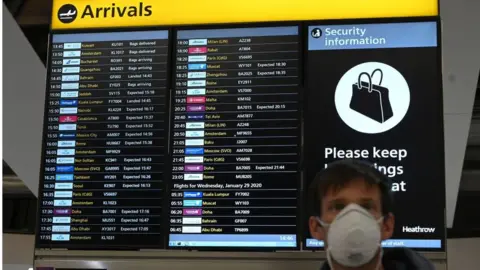UK 'to bring in 14-day quarantine' for air passengers
 Getty Images
Getty ImagesUK airlines say they have been told the government will bring in a 14-day quarantine for anyone arriving in the UK from any country apart from the Republic of Ireland in response to the coronavirus pandemic.
The new restriction is expected to take effect at the end of this month.
Industry body Airlines UK said the policy needed "a credible exit plan" and should be reviewed weekly.
People arriving in the UK would have to self-isolate at a private residence.
Government and aviation sources told BBC News that the quarantine would mean people might be expected to provide an address when they arrive at the border.
It is not clear how long the new travel restriction would be in place and whether non-UK residents would be allowed to stay in rented private accommodation.
"We need to see the details of what they are proposing", said Airlines UK, which represents British Airways, EasyJet and other UK-based airlines, in a statement.
It is not clear whether there are plans to quarantine people arriving to the UK via other modes of transport. Eurostar and P&O ferries declined to comment, while other firms have not yet responded to the BBC's queries.
Aviation minister Kelly Tolhurst is expected to clarify the policy to airline and airport representatives in a conference call scheduled for Sunday morning.
A spokeswoman for Belfast International Airport said it had written to the government to clarify what the plans were - adding that the airport had not been consulted on the move.
Shadow foreign secretary Lisa Nandy said Labour had been asking the government for weeks to clarify "mixed messages" about what people should do on arrival to the UK.
"People have been brought back in relatively large numbers and many of them are telling us that they have no information or advice given out about what they should be doing when they get home," she said.
UK airports suggested that a quarantine "would not only have a devastating impact on the UK aviation industry, but also on the wider economy".
Karen Dee from the Airport Operators Association, which represents most UK airports, said the measure should be applied "on a selective basis following the science" and "the economic impact on key sectors should be mitigated".
BBC News understands that key workers such as lorry drivers who transport goods and people working in the shipping industry would be exempt.

- A SIMPLE GUIDE: How do I protect myself?
- AVOIDING CONTACT: The rules on self-isolation and exercise
- HOPE AND LOSS: Your coronavirus stories
- LOOK-UP TOOL: Check cases in your area
- FACE MASKS: Should I be wearing one?

A Heathrow spokesman said any measures agreed must be medically effective, meet public expectations and be deliverable by airports.
"We will continue to do everything we can to support the government in tackling the health crisis whilst keeping vital trading routes open for British businesses in every corner of the UK," he added.
Last Sunday, Andrew Marr asked the transport secretary whether the UK would introduce a quarantine on people arriving in the UK.
Grant Shapps said he was "actively looking at these issues, right now, so that when we have infection rates within the country under control we're not importing".
He said it was important "that we do ensure that the sacrifices, in a sense, social distancing, that we're asking the British people to make are matched by anyone who comes to this country".
A Home Office spokesperson said: "We do not comment on leaks. The focus remains on staying at home to protect the NHS and save lives."
If a quarantine is needed now, some will question why it was not necessary weeks ago.
Tens of thousands of people have flown into the UK during the pandemic, although the government says the vast majority were returning home.
In other developments:
- The BBC understands Transport Secretary Grant Shapps will encourage the public to continue to work from home if they can, while those who need to travel will be encouraged to walk or cycle
- Young men are more likely than young women to break lockdown rules, psychologists suggest
- Up to 2,000 UK seafarers are stranded on ships around the world because of coronavirus lockdowns, the industry's trade body tells the BBC
- Wales' First Minister Mark Drakeford says the prime minister's plans for easing the lockdown measures in England - to be detailed in a speech by Boris Johnson on Sunday - would be "very much in line" with "modest" changes already outlined in Wales, Scotland and Northern Ireland
- On Saturday a further 207 deaths of people who tested positive for Covid-19 were confirmed in England, as well as 36 more deaths in Scotland and nine in Wales
- The total UK death toll rose to 31,241 on Friday
